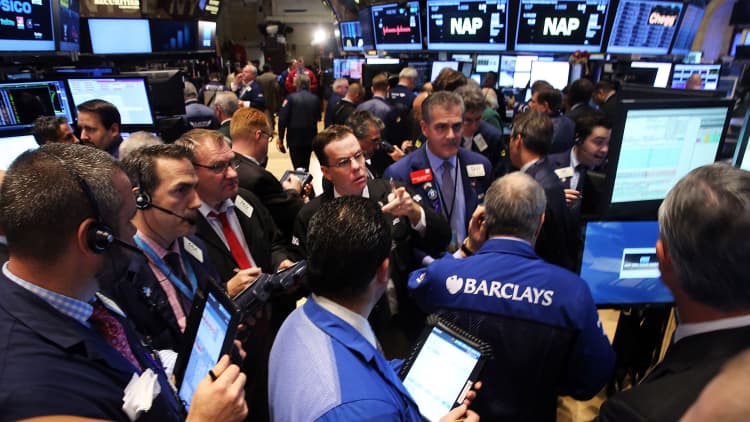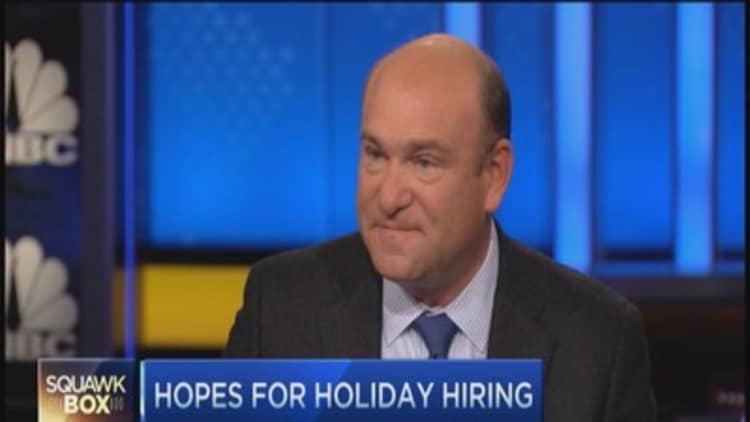
U.S. stocks were little changed on Wednesday, with benchmarks at or near all-time highs, as Wall Street took in stride minutes from the Federal Reserve's last policy meeting, which had some central bankers concerned prices are not increasing rapidly enough.
The minutes from the central bank come from its October session, at which the Fed finished its bond-buying program, while sticking with its pledge to keep interest rates low for a considerable period.
The minutes had Fed members continuing to "expect inflation to move back to the committee's 2 percent target over the medium term as resource slack diminished in an environment of well-anchored inflation expectations."
Still, many members noted the Federal Open Market Committee should be on the lookout for a possible "downward shift in longer-term inflation expectations. Some of them noted that if such an outcome occurred, it would be even more worrisome if growth faltered."
"The inflation side of their mandate is their ace in the hole. If you look at the trajectory of nonfarm payrolls, since the beginning of the year, it's been running over 200,000 a month. If that continues we will reach full employment in the first quarter of next year. But if inflation is running significantly below the 2 percent level, that gives them more time," said Mike Materasso, senior vice president and co-chair of the Franklin Templeton fixed-income policy committee.
"There's a nagging concern that the Fed has, that despite all the metrix, of raising rates too soon," Materasso added.
"As inflation remains low, well below their own internal target, it gives the Fed more leeway to keep rates lower for longer," said Tom Kersting, principal and fixed-income investment strategist at Edward Jones.
"This really wasn't a significant announcement, bond, stock and currency markets haven't moved materially on the release," Kersting noted.
The CBOE Volatility Index, one measure of investor uncertainty, rose 1 percent to 14.00.
Major U.S. Indexes
Erasing losses and rising 24 points in the minutes just after the Fed release, the Dow Jones Industrial Average ended the session down 2.09 points at 17,685.73, with Verizon Communications leading losses that included 17 of 30 components.
The fell 3.08 points, or 0.2 percent, to 2,048.72, with telecommunications the worst performing and energy faring the best of 10 major industry groups.
The Nasdaq dropped 26.73 points, or 0.6 percent, to 4,675.71.
For every five stocks rising, roughly nine declined on the New York Stock Exchange, where 737 million shares traded. Composite volume cleared 3.4 billion.
The U.S. dollar edged higher against the currencies of major U.S. trading partners; the yield on the 10-year Treasury note used to figure mortgage rates and other consumer loans added 4 basis points to 2.3541 percent.
On the New York Mercantile Exchange, crude futures for December delivery fell 3 cents cents to $74.58 a barrel; gold futures for December fell $3.20 to $1,193.90 an ounce.
"The economy has been improving, the jobs picture has been improving, but the key for markets, and why a lot of people are skeptical, is can it continue to do that without Fed support, is this economy going to be strong enough to handle it," said Nick Raich, CEO at the Earnings Scout.
Read MoreRepublicans looking to turn up heat on Fed in 2015
"It seems to me the bullish case makes the most sense. Things like low inflation and zero interest rates in real terms, the stronger dollar and this new-found abundance in oil and gas, profit margins at record levels and the economy certainly doesn't seem like it's going to roll over or play dead. To be bearish now, you have to say none of that accounts for anything," said Martin Leclerc, principal, chief investment officer and portfolio manager of Barrack Yard Advisors.
Wednesday's economic data had the Commerce Department reporting unexpectedly fell in October, down 2.8 percent, while permits surged to their highest in more than six years.
A separate report, this one from the Mortgage Bankers Association, had mortgage applications unexpectedly rising last week.
Target rose after the retailer posted quarterly earnings that beat estimates.
"Prolonged weakness out of Europe is having an impact on multinational earnings expectations," said Raich, who pointed to a "noticeable deterioration in the fourth quarter and beyond" as companies factor in the stronger dollar and weakness out of Europe.
On Tuesday, U.S. stocks rose, lifting the Dow and S&P 500 to their loftiest ever, as a $66 billion deal by Actavis for Allergan helped drive gains in the healthcare sector and a gauge of sentiment among U.S. home builders increased more than expected.
Read More S&P, Dow end at record highs as global worries ease

Coming Up This Week:
Thursday
Earnings: Best Buy, Gap, Dollar Store, The Buckle, Ross Stores, Gamestop, Autodesk, Intuit, Marvel Tech, Mentor Graphics, Renren, Splunk
7:45 a.m.: Fed Gov. Daniel Tarullo
8:30 a.m.: Initial claims
8:30 a.m.: Consumer price index
10:00 a.m.: Existing-home sales
10:00 a.m.: Philadelphia Fed survey
10:00 a.m.: Leading indicators
1:30 p.m.: Cleveland Fed President Loretta Mester
8:30 p.m.: San Francisco Fed President John Williams
Friday
Earnings: Foot Locker, Ann
More From CNBC.com:


